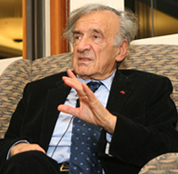Elie Wiesel on God, Man, and Sacrifice

In the Book of Genesis, God tests Abraham by commanding him to sacrifice his only son, Isaac. Abraham dutifully builds an altar, binds his son, and reaches for his knife, but as he is about to kill Isaac, he is stopped by an angel and instead sacrifices a ram that’s been caught in a nearby thicket.
It’s a seminal moment in biblical literature, says Nobel Peace Laureate and BU Professor Elie Wiesel — and in the history of humankind.
Wiesel (Hon.’74), BU’s Andrew W. Mellon Professor in the Humanities and an internationally recognized human rights activist and author, will explore the meaning of the story in the first talk of his annual lecture series, Three Encounters with Elie Wiesel: The Fascination with Jewish Tales, tonight at 7 p.m. Wiesel has given a series of free public lectures at the University every fall since 1975; this year’s series will be held on October 15, October 22, and October 29 in the George Sherman Union’s Metcalf Hall.
Tonight’s lecture is titled In the Bible: The Akedah Revisited: More Questions. Wiesel says he will explore all of the questions surrounding the Akedah, or the binding of Isaac. “How could God do that? How could Abraham accept it? Why did Isaac accept it?” Wiesel asks. “Was Abraham going to kill him? What was the purpose? What was the meaning of that?” He has lectured on the subject twice before, and “each time I discover more and more,” he says. “Each time I find absolutely new things.”
The second lecture, on October 22, In Hasidism: Rebbe Leib Soreh’s and His Mysterious Powers, will focus on a disciple of the founder of the Hasidic movement. “He was a kind of James Bond,” Wiesel says. “He was everywhere and succeeded in doing everything.”
The October 29 lecture deals with a subject that BU President Emeritus John Silber asked Wiesel to speak about a decade ago — In Religion: The Jewishness of Jesus: A Personal Interpretation. Silber will introduce the lecture. “I simply needed time to reflect and to go to all of the sources,” Wiesel says. “I read some 30 or 40 books on the subject.”
His conclusions about Jesus? “I really think he was a good Jew,” says Wiesel. “He was a very pious Jew. I think — and not only do I say it, but many say it — had he lived in my time, he would have been sent to Auschwitz. No doubt.”
At 15, Wiesel was deported to the Nazi concentration camp along with his family. His mother and younger sister died there. He and his father were later taken to Buchenwald; his father perished before the camp was liberated in 1945.
Wiesel went on to become a scholar, a teacher, and an author of more than 50 books, including the memoir Night, an account of his experience during the Holocaust. Night was first published in Yiddish in 1956. A new English-language edition of the book came out in 2006 and became a best seller.
His annual lectures are meant to draw people of all faiths, Wiesel says. “I don’t cater to one group or another. I am here to share my vision of things, my thirst for knowledge, and my hope that humanity can be redeemed.”
All lectures in the series take place in the George Sherman Union’s Metcalf Hall, 775 Commonwealth Ave., and are free and open to the public. Doors open at 6 p.m. for the 7 p.m. events. For more information, call 617-353-2238.
Cynthia Buccini can be reached at cbuccini@bu.edu.